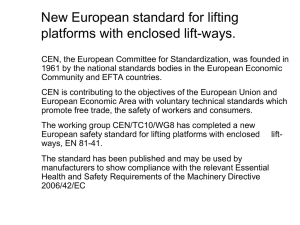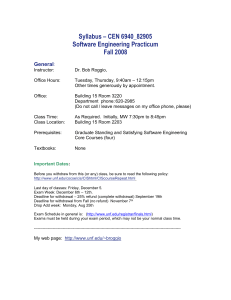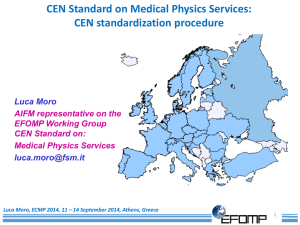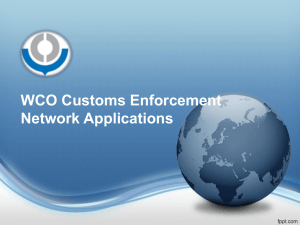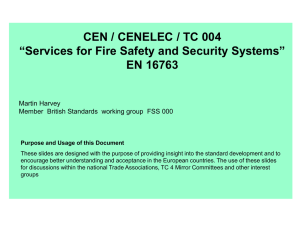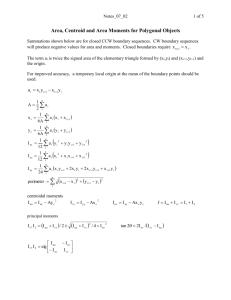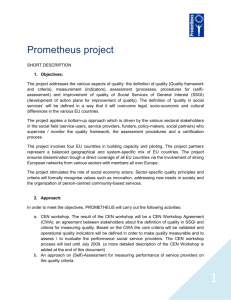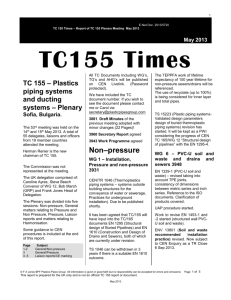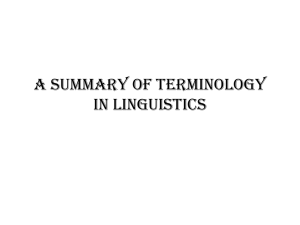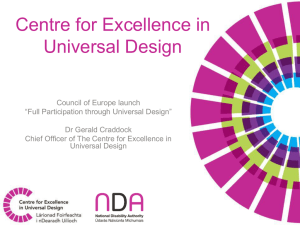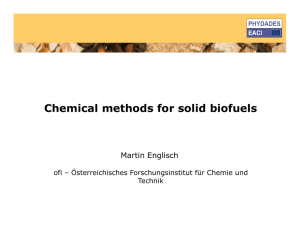CEN/TC 278 Scope 5
advertisement
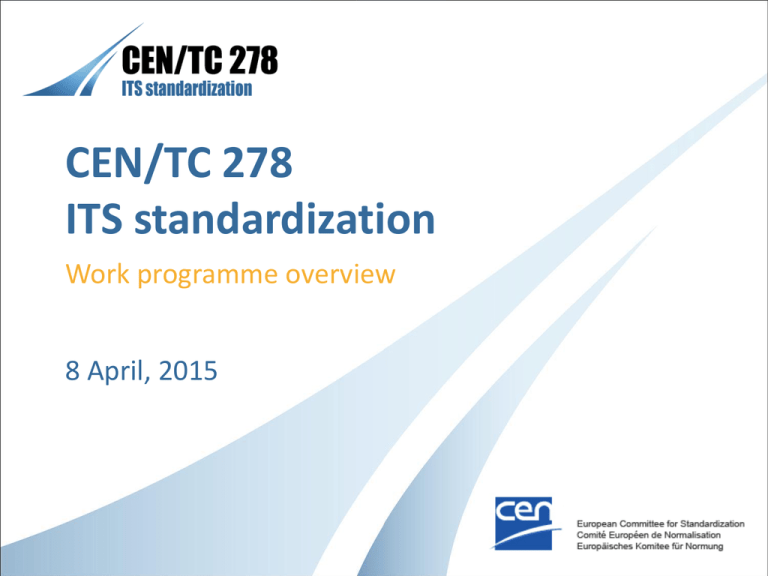
CEN/TC 278 ITS standardization Work programme overview 8 April, 2015 Presentation content ITS standardization CEN/TC 278 ITS action plan and mandate M/453 2 Why do we need ITS standards Enables interoperability of systems/services Encourages innovation, fosters enterprise and opens up new markets for suppliers Creates trust and confidence in products and services Expands the market, brings down costs and increases competition Helps to prevent duplication of effort Supports greater confidence in procurement Interchangeability of system component suppliers 3 The formal standards bodies for ITS Global level – ISO/TC 204 – Intelligent Transport Systems – ISO/TC 22 – Road vehicles European level – CEN: CEN/TC 278 for ITS, CEN/TC 226 Machine Readable cards – CENELEC/TC 226 Road equipment – ETSI TC ITS National level – National standards bodies: NEN, DIN, AFNOR, BSI …… Coördinaten between CEN/ETSI/EC through ITSCG Intelligent Transport Systems Coördinaten Group 4 CEN/TC 278 Scope CEN/TC 278 Road transport and traffic telematics Standardization in the field of telematics to be applied to road traffic and transport, including those elements that need technical harmonisation for intermodal operation in the case of other means of transport. It shall support … vehicle, container, swap body and goods wagon identification; communication between vehicles and road infrastructure; communication between vehicles; in-vehicle human machines interfacing as far as telematics is concerned; traffic and parking management; user fee collection; public transport management; user information. 5 CEN/TC 278 Road transport and traffic telematics Established in 1992 31 national members 59 standards under development, 99 adopted standards 11 working groups with over 300 nominated experts Cooperation between market players: industries, service providers, governments Well connected to European R&D Chair: Lex Eggink (RWS), Secretary: Maarten Peelen (NEN) 6 CEN/TC 278 and European Legislation Directive 2004/52/EC (EFC directive) on the interoperability of electronic road toll systems in the Community Directive 2010/40/EU (ITS directive) on the framework for the deployment of Intelligent Transport Systems The ITS action plan identifies priority areas where actions are necessary to lift the barriers hampering a wider and more coordinated deployment and use of ITS Mandate M/453 on Co-operative systems to support interoperability of co-operative systems for intelligent transport in the European Community Mandate M/338 on Electronic Fee Collection in support of Interoperability of electronic road toll systems in the Community Commission Decision 2009/750/EC on the definition of the European Electronic Toll Service and its technical elements 7 CEN/TC278 Active working groups WG 1 WG 2 WG 3 WG 4 WG 8 WG 9 WG 10 WG 12 WG 13 WG 14 WG 15 WG 16 8 Electronic Fee Collection (Sweden) Freight, Logistics and Comm. Vehicle Operations (UK) Public Transport (France) Traffic and Travel Information (UK) Road Traffic Data (NL) DSRC (dormant) Human-Machine Interfacing (Germany) AVI/AEI (Norway) Architecture and Terminology (UK) Recovery of stolen vehicles (UK) e-Safety / eCall (UK) Co-operative systems (Germany) Overview of CEN/TC 278 Activities WG 1 2 3 4 8 9 10 12 13 14 15 16 Totals 9 Electronic Fee Collection Freight, Log. and Com. Vehicle Operations Public Transport Traffic and Traveller Information Road Traffic Data DSRC Human-Machine Interfacing Auto. Vehicle & Equip. Identifi. Architecture & Taxonomy After Theft Systems eSafety / eCall Co-operative Systems Publications Under Development Preliminary Work Items 23 - 17 - 2 3 19 28 3 4 5 12 6 4 99 1 16 1 1 5 1 2 2 43 6 1 1 1 5 19 Alignment of Working Groups CEN/TC 278 – – – – – – – – – – 10 ISO/TC 204 WG1 (Electronic Fee Collection) WG2 (Freight, Logistics and Commercial Vehicle Operations) WG3 (Public Transport) WG4 (Traffic and Traveller Information) WG8 (Road Traffic Data) – – WG12 (Automatic Vehicle & Equipment Identification) WG13 (Architecture) – WG14 (After Theft Systems for the Recovery of Stolen Vehicles) WG15 (eSafety / eCall) WG16 (Co-operative Systems) – – WG5 (Fee and Toll Collection) WG7 (General Fleet Management and Com./Freight Operations) WG8 (Public Transport) WG10 (Traveller Inform. Systems) WG9 (Integrated Transport Information, Management and Control) WG4 (Automatic Vehicle & Equipment Identification) WG1 (Architecture) WG3 (Database Technology) WG14 (Vehicle/Roadway Warning and Control Systems) WG16 (CALM) WG17 (Nomadic Devices) – WG18 (Co-operative Systems) – – – – – – How do the WGs fit together? 11 (Based on a design concept of AustRoads, 2010) Cross reference: one example How do we ensure this channels convey same message? Traffic and Travel Information Standards & Cooperative Systems Traffic and Travel Information Standards 12 ITS Standardisation results in TC 278 Over 99 European ITS standards have been completed A real success story: Traffic Message Channel (TMC) is a technology for delivering traffic and travel information to drivers in the home language of the traveller! Other success stories: EFC and DSRC with outreach in Australia, South-Africa and Brazil 13 ITS action plan and mandate M/453 ITS action plan originated by EC for deployment of ITS – Priority items identified in the ITS field Mandate M453: focus on standards for co-operative systems – Request to the ESO’s to propose single combined work programme – Both ETSI and CEN have accepted responsibility – CEN/TC278 formed WG16, cooperation with ISO/TC204/WG18 Directive 2010/40/EU: Framework for the Coordinated and Effective Deployment and Use of Intelligent Transport Systems Coordination through ITS-CG (CEN, ETSI, EC) Cross-reference between CEN/TC278 and ISO/TC204 WG’s 14 Consensus driven process Hungary National stakeholders NSB Influence through participation Influence through correspondence 15 Drafting standards: proces, timelines and actors Proposal stage Enquiry stage Public commenting • Acceptance proposal • Min. 5 participating CEN members Committee stage * TC commenting * Optional Approval stage Vote (Agree / Disagree/ Abstain) Influence through participation Influence through correspondence 16 Contact CEN/TC 278 secretariat Mr. M. Peelen maarten.peelen@nen.nl www.itsstandards.eu 17
